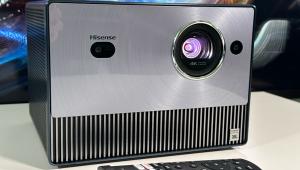Lexicon MC-12 surround-sound processor Page 4
Not surprisingly, a comparison of the MC-1 and MC-12 using Dolby Digital and DTS soundtracks produced results similar to those with music. I watched (and listened to) a DTS version of U-571; as before, I definitely heard slightly improved bass definition, clearly audible with the depth-charge explosions.
Played back in Dolby Digital, the Gladiator soundtrack seldom offered the rich bass that U-571 provides in abundance. But the strings in the ever-present theme music were a tad more warm and smooth than with the MC-1. This difference was subtle—every time I've watched Gladiator, I've thoroughly enjoyed the soundtrack, whether played through the MC-1 or the MC-12.
As with the MC-1, the MC-12's video switching offered no reason for complaint—even with high-definition sources. I was able to rig a near-instantaneous A/B switch using my Sony SAT HD-100 digital receiver and reference Sony VPH-G90U CRT projector. The Sony receiver offers component and VGA outputs; I connected the component output to the Lexicon and the VGA output directly to the projector. Watching an over-the-air high-definition documentary on WETA-HD here in Washington, DC, I switched back and forth and could detect no degradation of the signal—none—between the switched and un-switched versions.
A similar comparison of DVDs using the MC-1 and MC-12 with S-video signals revealed little, if any, difference between them, apart from a slightly brighter image from the MC-12. This might well have originated in very slight setup differences in the two projector inputs I used. I'd call the comparison a draw. The video switchers in the MC-1 and MC-12 are both excellent.
Conclusions
The Lexicon MC-12 is an excellent piece of equipment and is highly recommended, but it isn't the only processor available. If you don't want to spend $10,000, you should have a look at Sunfire's generally excellent Cinema Grand II. For the very reasonable price of $3295, it offers component video switching, 5.1-channel analog pass-through, and balanced audio outputs. Sonically, the Sunfire can't match the Lexicon (though the differences are not dramatic), and it has fewer inputs and outputs. But the Sunfire has a nice touchscreen remote—and a tuner and a phono input to boot!
Then there's the Theta Digital Casablanca II, which ranges in price from $6000 to $17,000, depending on how it's configured. It doesn't offer component-video switching or 5.1-channel analog pass-through, and in most of its configurations it, too, has fewer inputs and outputs than the MC-12. I had a Casablanca II in-house for a while before the arrival of the MC-12, and found my MC-1 to be, at least sonically, competitive. The MC-12 would be even more so. Then there are the processors from Meridian, TheaterMaster, EAD, and others. I haven't used all of these, but I'd be surprised if any is notably superior to the MC-12.
And, of course, you should still consider the MC-1. Lexicon intends to continue selling it, and the MC-1 is a lot less expensive and an outstanding performer. The sonic differences between the MC-1 and the MC-12 are real but not dramatic—you'll have to have a high-quality audio system and actually be listening for those differences to appreciate them. If you don't intend to buy an SACD or DVD-Audio player any time soon and don't care about component-video switching, the MC-1 may still be a good choice for you.
The MC-12 is, undoubtedly, an expensive preamp-processor. But it's very flexible, easy to use, upgradeable, rich in features, sonically excellent—and handsome. What more could you want?
- Log in or register to post comments




















































